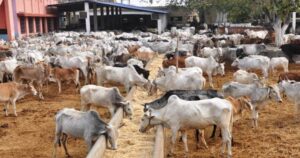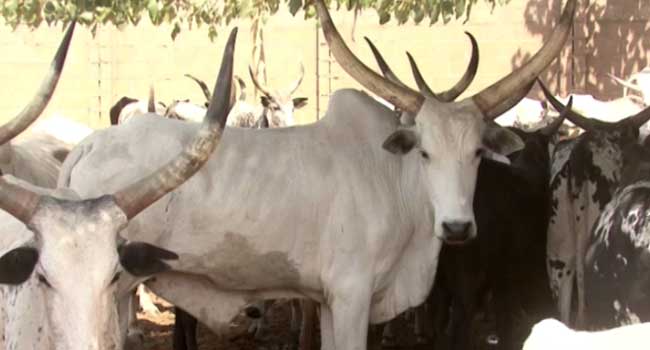The Taraba State government has taken swift and decisive action in response to a deadly outbreak of hemorrhagic septicemia, a highly contagious livestock disease, by imposing a ban on the movement of cattle to and from the Mambilla Plateau in the Sardauna Local Government Area. This drastic measure comes in the wake of reports confirming that the outbreak has already claimed the lives of over 1,000 cattle, raising alarm across the region.
In an effort to curb the spread of this deadly disease, the state government, in collaboration with the Federal Ministry of Agriculture and Food Security, has alerted neighboring states to implement precautionary measures. These measures aim to prevent the spread of the outbreak to other regions, including the Republic of Cameroon, which shares a border with the affected area. In the meantime, vaccination and treatment initiatives have already begun in the hardest-hit regions.
During a recent press briefing held in Jalingo, Dr. Nathan Francis, the Director of Veterinary Services for Taraba State, emphasized the critical importance of cooperation and coordinated efforts to contain the outbreak. He stressed that the Mambilla Plateau, which boasts the highest concentration of livestock in Nigeria with an estimated population of between 800,000 and one million animals, is particularly vulnerable.
“We have already procured antibiotics, and our veterinary officers are currently on the ground administering these treatments across the Mambilla Plateau,” Dr. Francis explained. “In addition, we have secured hemorrhagic septicemia vaccines and are preparing to launch an extensive vaccination campaign. This campaign will not only target the Mambilla Plateau but will also extend to neighboring local government areas such as Gashaka, Kurmi, and parts of Takum.”
 However, Dr. Francis acknowledged that the state is facing significant challenges in addressing the outbreak, including shortages of essential drugs and vaccines, inadequate cold chain facilities for vaccine storage, and limited financial resources. Compounding the situation is the presence of contagious bovine pleuropneumonia, which is causing a mixed infection scenario and further complicating efforts to control the outbreak.
However, Dr. Francis acknowledged that the state is facing significant challenges in addressing the outbreak, including shortages of essential drugs and vaccines, inadequate cold chain facilities for vaccine storage, and limited financial resources. Compounding the situation is the presence of contagious bovine pleuropneumonia, which is causing a mixed infection scenario and further complicating efforts to control the outbreak.
Despite these challenges, Dr. Francis sought to reassure the public by stating, “I want to calm the public by assuring them that the situation is under control. It is important to note that this disease does not pose a risk to human health, and consuming meat remains safe as long as it is thoroughly cooked.
Given that Sardauna Local Government Area shares a border with Cameroon, we recognize the need for a collaborative effort with Cameroonian authorities to effectively control the spread. This will involve implementing a ring vaccination strategy to contain the outbreak.”
The gravity of the situation has prompted the Federal Government to deploy the National Rapid Response Team to Taraba State. This team, led by Dr. Ajani Oyetunji, Deputy Director of the Department of Veterinary and Pest Control Services at the Federal Ministry of Agriculture, has been dispatched to support the state’s efforts in managing the crisis. Dr. Oyetunji revealed that over 15,000 cattle have already been affected by the outbreak, highlighting the scale of the disaster.
“The National Rapid Response Team was sent to Taraba under the directive of the Chief Veterinary Officer of Nigeria,” Dr. Oyetunji stated. “Our goal is to complement the state’s response activities, synchronize efforts, and strengthen the overall response to this outbreak.
One of our key strategies is to enhance the surveillance system to ensure early detection of the disease. We are also reinstating case management protocols to properly treat affected animals and are actively educating farmers on preventative measures to protect their livestock from further infection.”
Dr. Oyetunji also emphasized that the Federal Government has taken significant steps to bolster the capacity of veterinarians in Taraba State. This includes providing essential resources such as reporting tools, cold chain facilities, and other critical veterinary supplies. He noted that these efforts align with President Bola Tinubu’s agenda to enhance food security across the country, by improving livestock production through effective animal health services.
In a related development, Governor Agbu Kefas, represented by his Special Adviser on Agriculture and Food Security, Zanau Maikasuwa, expressed the state government’s proactive approach in dealing with the outbreak. He also conveyed appreciation for the support received from the Federal Government and the Food and Agriculture Organization (FAO).
“The state government is fully aware that cattle farming is a major source of livelihood for many of our residents,” Maikasuwa said. “We are committed to ensuring that these businesses do not collapse due to disease outbreaks. We are also appealing for additional support to establish a diagnostic center in Taraba, which would enable us to quickly identify and address livestock diseases that threaten the state’s agricultural economy.”
This coordinated response underscores the seriousness with which both the state and federal governments are addressing the hemorrhagic septicemia outbreak. As efforts continue to contain the disease and protect the livestock industry, the collaboration between various stakeholders will be crucial in mitigating the impact of this crisis on the region’s economy and food security.




